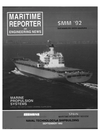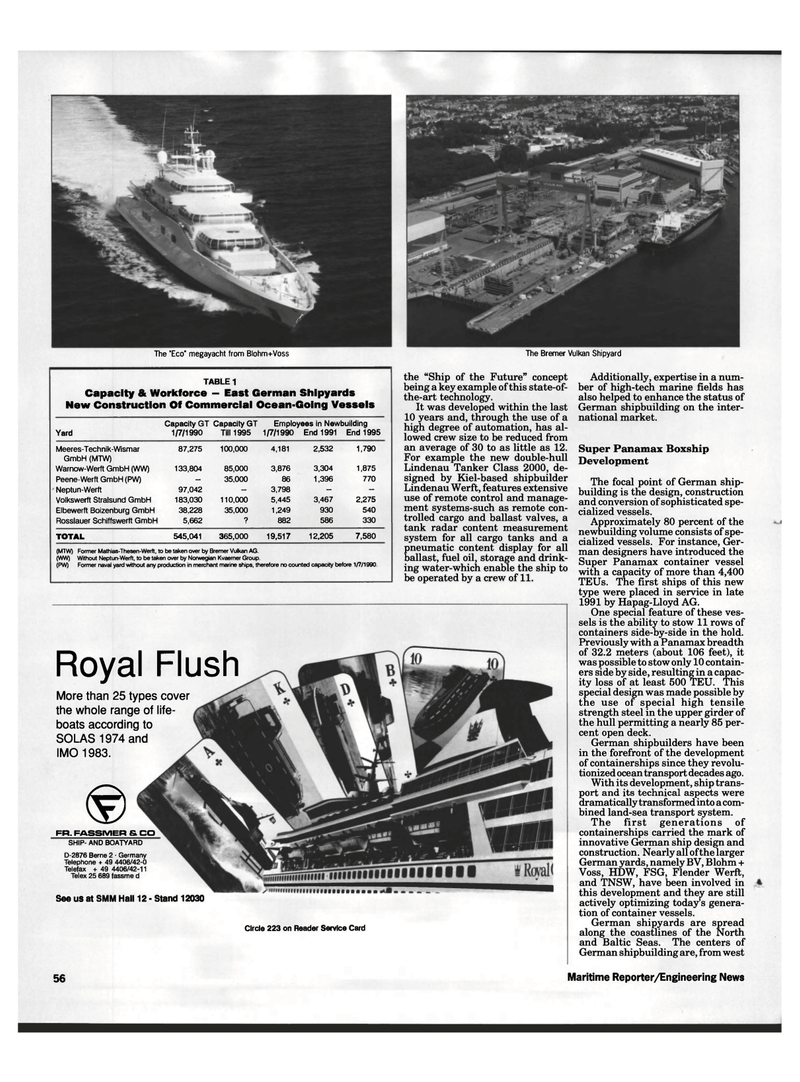
Page 58: of Maritime Reporter Magazine (September 1992)
Read this page in Pdf, Flash or Html5 edition of September 1992 Maritime Reporter Magazine
/
The "Eco" megayacht from Blohm+Voss The Bremer Vulkan Shipyard
TABLE 1
Capacity & Workforce — East German Shipyards
New Construction Off Commercial Ocean-Going Vessels
Capacity GT Capacity GT Employees in Newbuilding
Yard 1/7/1990 Till 1995 1/7/1990 End 1991 End 1995
Meeres-Technik-Wismar 87,275 100,000 4,181 2,532 1,790
GmbH (MTW)
Warnow-Werft GmbH (WW) 133,804 85,000 3,876 3,304 1,875
Peene-Werft GmbH (PW) - 35,000 86 1,396 770
Neptun-Werft 97,042 - 3,798 - -
Volkswerft Stralsund GmbH 183,030 110,000 5,445 3,467 2,275
Elbewerft Boizenburg GmbH 38,228 35,000 1,249 930 540
Rosslauer Schiffswerft GmbH 5,662 ? 882 586 330
TOTAL 545,041 365,000 19,517 12,205 7,580 (M7W) Former Mathias-Thesen-Werft, to be taken over by Bremer Vulkan AG. (WW) Without Neptun-Werft, to be taken over by Norwegian Kvaerner Group. (PW) Former naval yard without any production in merchant marine ships, therefore no counted capacity before 1/7/1990. the "Ship of the Future" concept being a key example of this state-of- the-art technology.
It was developed within the last 10 years and, through the use of a high degree of automation, has al- lowed crew size to be reduced from an average of 30 to as little as 12.
For example the new double-hull
Lindenau Tanker Class 2000, de- signed by Kiel-based shipbuilder
Lindenau Werft, features extensive use of remote control and manage- ment systems-such as remote con- trolled cargo and ballast valves, a tank radar content measurement system for all cargo tanks and a pneumatic content display for all ballast, fuel oil, storage and drink- ing water-which enable the ship to be operated by a crew of 11.
Circle 223 on Reader Service Card
Additionally, expertise in a num- ber of high-tech marine fields has also helped to enhance the status of
German shipbuilding on the inter- national market.
Super Panamax Boxship
Development
The focal point of German ship- building is the design, construction and conversion of sophisticated spe- cialized vessels.
Approximately 80 percent of the newbuilding volume consists of spe- cialized vessels. For instance, Ger- man designers have introduced the
Super Panamax container vessel with a capacity of more than 4,400
TEUs. The first ships of this new type were placed in service in late 1991 by Hapag-Lloyd AG.
One special feature of these ves- sels is the ability to stow 11 rows of containers side-by-side in the hold.
Previously with a Panamax breadth of 32.2 meters (about 106 feet), it was possible to stow only 10 contain- ers side by side, resulting in a capac- ity loss of at least 500 TEU. This special design was made possible by the use of special high tensile strength steel in the upper girder of the hull permitting a nearly 85 per- cent open deck.
German shipbuilders have been in the forefront of the development of containerships since they revolu- tionized ocean transport decades ago.
With its development, ship trans- port and its technical aspects were dramatically transformed into a com- bined land-sea transport system.
The first generations of containerships carried the mark of innovative German ship design and construction. Nearly all of the larger
German yards, namely BV, Blohm +
Voss, HDW, FSG, Flender Werft, and TNSW, have been involved in this development and they are still actively optimizing today's genera- tion of container vessels.
German shipyards are spread along the coastlines of the North and Baltic Seas. The centers of
German shipbuilding are, from west 56 Maritime Reporter/Engineering News
Royal Flush
More than 25 types cover the whole range of life- boats according to
SOLAS 1974 and
IMO 1983. ©
FR. FASSMER S. CO
SHIP- AND BOATYARD
D-2876 Berne 2 • Germany
Telephone + 49 4406/42-0
Telefax + 49 4406/42-11
Telex 25 689 fassme d
See us at SMM Hall 12 - Stand 12030

 57
57

 59
59
